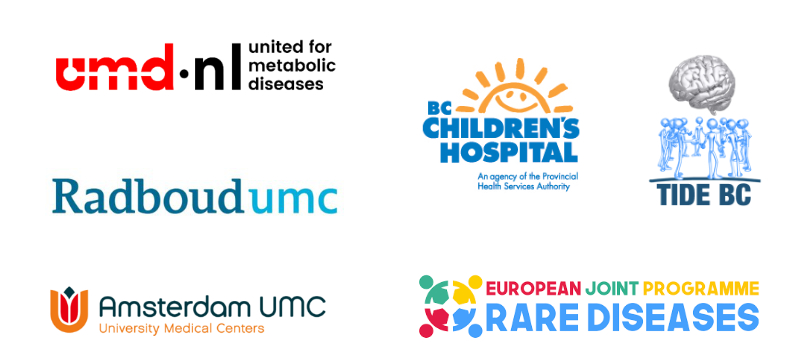Pyridoxine- Dependent Epilepsy: towards newborn screening for a treatable epilepsy and intellectual disability syndrome
Lead researcher: Dr. Karlien Coene, Radboud umc, Nijmegen, The Netherlands
Pyridoxine-dependent epilepsy (PDE-ALDH7A1) is a devastating metabolic disease, for which diagnostic delay hampers optimal clinical and cognitive outcome of patients. Based on population genetics data, the estimated incidence of this disease is 1:60.000, which is higher than the observed incidence. This indicates that this condition is likely underdiagnosed. Unfortunately, PDE has not been included in newborn screening (NBS) so far due to the lack of a suitable blood-based biomarker. The aim of our research is to further validate the novel PDE-biomarker 2-OPP, which we have recently identified in our lab through an untargeted metabolomics approach (link naar Engelkerke 2021), for application in NBS. A pilot study into validation of this new biomarker for NBS was funded by United for Metabolic Diseases NL. We aim to further scale up this validation with the goal to achieve implementation of PDE-ALDH7A1 in NBS in the Netherlands and beyond.
This research is funded by United for Metabolic Diseases NL.
Multi-omics in PD
Lead researcher: Dr. Eduard Struijs, Amsterdam UMC, Amsterdam, The Netherlands
Metabolomics in combination with transcriptomics analyses will be performed to identify new aspects of the pathophysiology of PDE.
This research is funded by Amsterdam Gastroenterology and Metabolism (AGEM).
CHARLIE: Changing rare disorders of lysine metabolism
Consortium coordinator: Clara van Karnebeek, Radboudumc, Nijmegen, The Netherlands
Rare inborn errors of lysine metabolism such as pyridoxine-dependent epilepsy (PDE) and glutaric aciduria type 1 (GA1) cause debilitating, often progressive neurologic symptoms with chronic care dependency. The international CHARLIE project synergizes the expertise of patient representatives, basic and clinical scientists, to collaboratively develop and validate new therapies and biomarkers. We pursue different strategies to avoid brain damage: inhibition of the enzyme upstream to GA1 and PDE with the potential to prevent build-up of highly reactive metabolites as well as gene therapy to replace the missing GA1 enzyme. We will first apply these in PDE and GA1 model systems, such as neuronal stem cells, mouse and zebrafish models. To evaluate and compare the efficacy of these different treatment approaches, we will perform biochemical, morphological, neurobehavioural analyses. We will develop tools for monitoring therapeutic effect, enabling personalized medicine. With our patient advocacy organizations, we will prioritize the most promising treatment strategy/-ies and enhance trial readiness. To inform families, professionals, and stakeholders, we will organize regular meetings and create digital platforms. For successful exploitation, we engage industry and policymakers. Together our CHARLIE consortium will translate knowledge from bench to bedside, with drug access for improved outcomes for PDE and GA1 patients and families.
Lysine Reduction Therapies (LRT) study
Lead Researcher: dr. Curtis Coughlin, Children’s Hospital Colorado, Colorado, Denver, USA, prof. Clara van Karnebeek, Radboudumc, Nijmegen, The Netherlands, & Laura Tseng MD, Amsterdam UMC, Amsterdam, The Netherlands
Treatment with adjunct lysine reduction therapies (lysine restricted diet and arginine supplementation) in PDE have been associated with improved cognitive outcomes in several but not all patients. With the use of the international PDE registry effect of LRT on neurodevelopmental outcome and seizure status will be evaluated in larger patient numbers. First results are expected soon.
The PDE sibling study: effect of early treatment initiation
Lead Researcher: prof. Clara van Karnebeek, Radboudumc, Nijmegen, The Netherlands, dr. Curtis Coughlin, Children’s Hospital Colorado, Colorado, Denver, USA, & Laura Tseng MD, PhD student, Amsterdam UMC, Amsterdam, The Netherlands
75% of PDE-ALDH7A1 patients suffer an intellectual/developmental delay while on pyridoxine treatment. Adjunct lysine reduction therapies (LRT) have been developed to overcome these impairments and are associated with improved cognitive outcomes. However, not all patients have had normal outcomes, possibly due to timing of treatment. This study is performed to determine whether patients treated early with pyridoxine and adjunct LRT would have an improved neurodevelopmental outcome compared to their late treated sibling. In addition, siblings on pyridoxine monotherapy will be compared.
PDE in adulthood: delineation of disease course
Lead Researcher: prof. Clara van Karnebeek, Radboudumc, Nijmegen, The Netherlands, & Laura Tseng MD, Amsterdam UMC, Amsterdam, The Netherlands
Currently, lack of natural history data impedes introduction of PDE in newborn screening panels and thus the potential to improve outcome. Capturing data on adults has proven complex, as individuals are often lost to follow up. An online survey study on psychosocial effects of PDE in adulthood has been initiated and together with data from the PDE registry we aim to gain more insight in PDE on the adult age. Questionnaires include assessments regarding quality of life, participation in daily life and cognitive functioning. For now, only enrollment of Dutch adult PDE patients is possible (spring 2021). For more information click here.
This research is funded by United for Metabolic Diseases NL.
PDE MAX
PI’s: prof. Clara van Karnebeek, Radboudumc, Nijmegen, The Netherlands & dr. Emma Footitt, Great Ormond Streat, London, UK
Vitaflo conducts a feasibility study to evaluate PDE MAX, a food for special medical purposes for the use in the dietary management of PDE, with regards to acceptability, tolerability, adherence and effect on metabolic control. In contrast to the GA1 aminoacid mixtures usually prescribed, this aminoacid mixture is lysine free but contains tryptophan. This study is conducted in the UK and the Netherlands.
This trial is funded by Vitaflo UK.

Contact us:
ObscureMyEmail